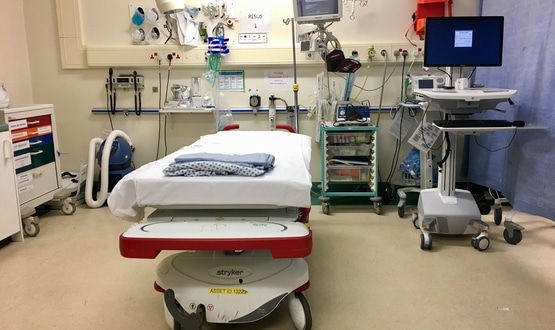Another view: of IT knowledge in primary care
- 30 January 2020

Though digital solutions exist in primary care, sometimes practice staff don’t know about them or don’t know how to implement them. Our GP columnist, Neil Paul, discusses whether a campaign to improve the IT knowledge in primary care is needed.
A couple of days ago, one of my partners came into my room almost bouncing with joy.
She and our deputy practice manager had sent 100 SMS messages to our ‘reluctant to attend the surgery’ asthmatic population. Within a few hours over 40 of them had replied giving the answers to the Quality and Outcome Framework (QOF) questions that we need to collect, saving us hours of work that we would usually have spent ringing around or seeing them.
Wins like these, I think, are the key to general practice’s survival, given the huge pressures we face with increasing demand and limited supply of staff.
While there is nothing revolutionary about two-way SMS messaging, I’m pleasantly surprised that my partner and deputy practice manager had spotted that this functionality existed, learnt how to use it and used it successfully in a matter of days.
Given it had taken about six months from me telling them about the software’s existence in the first place, to them getting around to installing it and using it, I was pleased by their enthusiasm for it – that they had bought into it and it was delivering. Originally, their reluctance was partly due to lack of headspace to deliver or implement new things.
Some of it is being burnt from IT that doesn’t work or goes wrong, combined with a reluctance to add in another app that you become reliant on. Some of it is not knowing what would help, or what questions to ask.
Getting the full benefit from IT
Despite being hard-working loyal and resilient, few primary care mangers seem to be highly IT literate. I wonder what can be done about this? I’m not talking about teaching people to use Microsoft office – I just mean really getting the potential benefits of IT.
Anyway, I mentioned how successful this new feature was to a couple of GP colleagues at a meeting. One of them replied: “Great! You must show us how to do that – we have that software, but I don’t think we can get it going”.
Others said: “You keep going on about this piece of software, but we’ve never got round to installing it or using it our place because we are too busy!”
This confirmed to me that something is going wrong in general practice. Solutions exist, but people don’t know about them and/or don’t know how to implement them. It’s not just about finding new products – some of it can be getting the best of a product you already have or creating new ones.
Of course, some of it may be a criticism of products that are difficult to learn or keep up-to-date.
Missing out on support
I have on numerous occasions in the last year or so come across individuals or practices that were using a feature or product to amazing benefit. Yet very few others get to find out about it, and therefore don’t gain the benefit.
What’s interesting about the SMS app above is that my surgery already has a different application from another company that the CSU pays for. I believe this also allows for two-way SMS messaging, but nobody knew it was capable of doing it, or how to do it. Isn’t it mad that the CCG/CSU pays for something, then purposely doesn’t spend enough time or effort making sure people get the most from it?
I believe that practices, while being proud independent contractors, are missing out on support at scale.
Very few practices have and particularly IT literate partner or manager, and those which do find their time is full. Few, meanwhile, are big enough to employ someone in such a role without other responsibilities.
Strength in numbers
Part of general practice’s strength is its independence. But also, I believe part of its weakness is this lack of central coordination, which neither CSU nor CCGs appear to be providing.
Getting a group of practices to do the same is not easy. We know from conferences, journals and magazines that there are a lot of potential products out there that might help primary care deliver a more efficient and productive service.
We know from speaking to companies that they find it incredibly difficult to get into practices and convince them of the benefits, partly because every practice works in a slightly different way and there is no coordinating service.
Perhaps a CCG is too big in scale and a practice is too small, though some are getting quite large now.
Hence, I think a primary care networks or GP federation is the right size, and why I think a key role for PCNs and federations is horizon scanning – sourcing and selecting new products and implementing them in a harmonised and standardised way for all.
The trick is: where does the money come from? Personally I don’t think the additional roles that have been promised and funding put aside for are going to be filled, and I think that IT support is just as important as a paramedic or doctor, so I would argue to free up this pot.
Need to improve IT knowledge in primary care
This website has long championed CCIOs as board-level posts. Perhaps it’s time for a campaign to improve the IT knowledge in primary care; for some new qualifications or training aimed at relevant knowledge and skills.
Is it time to develop new roles – one of an IT implementer/trainer, perhaps working in a couple or handful of practices, an IT manager working across a group of practices, and an IT lead clinician, which could be a GP or nurse or Allied Health Professional that the manager works with.
Regardless, we need someone who has time to understand clinicians’ needs, and speak out for them at senior level.





3 Comments
Let the doctors practice medecine, GPs should not have to be concerned with the data or IT, that is the responsibility of NHS E, DRs should focus on what they have been trained to DO, most of them love to do that. Your NHS and your DRs should focus on providing care4all.
Health Informatics IT is a new and complex clinical tool, no different from XRay and ultrasound machines, endoscopes and even the humble stethoscope back in their early days. Unless at least some clinicians understand in great detail how health IT works (and especially where and why it does not), and others learn more than the absolute minimum, we won’t get the maximum and safest clinical benefit from it. Instead, we’ll see more instances of actual patient harm from poor design, implementation or use. Health IT does not merely passively document the clinical process: it WILL change it. Either accidentally, in a mystically uncontrolled way and not necessarily for the better, or through considered and careful direction and so as an agent of positive clinical change. This latter scenario simply can’t become a reality if clinicians are recommended to not worry their pretty little heads about IT, and so to treat it all as a black box with no clinical benefit or risks to be understood – including any risks and benefits arising from NOT using it.
Thanks for the post – I completely agree! Which is why, I’m working with the Wessex AHSN to conduct research into digital readiness within primary care. This is to obtain a rounded view of willingness and ability for digitial transformation by both clinical and non-clinical primary care staff. Understanding the level and variation of digital readiness within primary care, should then help to guide the support needed.
Comments are closed.